Marcus Meurer: The Digital Nomad Revolution
What does success have to do with 6 pieces of T-shirts and strict morning routine? Who has this big vision of empowering people to live on their own terms?
It’s Marcus Meurer, a Digital Nomad, online entrepreneur and one of the founders of the global Digital Nomad movement, DNX. The mission of DNX is to connect and support Digital Nomads all over the world by organizing conferences, workshops, coworking camps, and more.
Marcus also runs successful online businesses, hosts a podcast, has found his love with kite surfing, lives a healthy lifestyle and dreams big!
As a location independent entrepreneur he prefers simple beach spots over cities and is the master of his own focus and productivity!
Stay tuned for this interview to learn more about being a leader of a global community and what it took to create such a strong tribe.
1. Marcus, you and your partner, Felicia, are the founders of the DNX movement. Would you tell us a bit about it? How did it all start? How did you become a Digital Nomad yourself and when was the idea of DNX born?
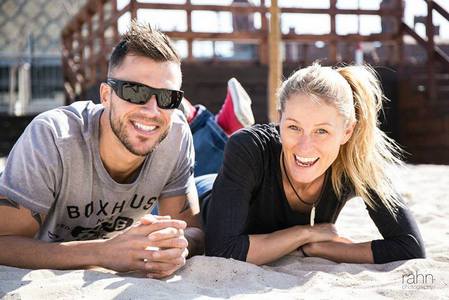 We became Digital Nomads at the end of 2012. Back then was a completely different game; there were no AirBnB’s where you could rent an apartment with proper internet and have a kitchen to cook for yourself.
We became Digital Nomads at the end of 2012. Back then was a completely different game; there were no AirBnB’s where you could rent an apartment with proper internet and have a kitchen to cook for yourself.
We had to stay in hostels; we were on a low budget. There were party backpackers, not enough plugs, and the internet did not work properly, especially in some countries, like South America.
The people around us didn’t get what we are doing so they felt sorry for us. They would ask what we are doing so there was a lot of explaining. A lot of just sitting in a corner, isolated, and being the only one who works on a computer.
It felt like the rest of the world was just in a different mode.
This is why we love to build communities like the DNX to connect people, helping and supporting each other. We were missing exactly this thing at the time.
There were no communities at all exchanging information about visa requirements, travel hacking, best mobile providers, local sim cards, and the best co-working spaces. There were no tropical co-working spaces back then—there was no Hubud, there was no KoHub, there was no Dojo Bali, there was nothing at all. There were some in bigger cities but I’m not a big city fan.
So before our start in The Digital Nomad lifestyle, we were working in Berlin startups as employees and had a lot of success. To what people call "success" means, in their eyes, is having a good salary, having a job title, having a lot of responsibilities, having my own team and also had head counts on my team.
But, at the end of the day, I was not living my life to the fullest.
Deep inside, I felt I had way more potential than sitting in the office all day, going to work every day from Monday to Friday, having long work hours, and only have just two days in a week or on the evenings when I could go for my passion. Going to the gym was also quite challenging when you work so long in the office and go very early morning the next day.
This was my life—I realized very quickly that this is not the life I want to live until the end of my days or until I’m 60 or 65. This is why I came to the conclusion that if I really want to change the world, do something sustainable, and live my potential to the fullest that I have to get self-employed.
So I quit my job in 2012 to get self-employed.
At the same time, Felicia, my girlfriend, with whom I started with a digital nomad lifestyle, with whom I’m doing all the business with 50/50, and who has been by my side since the very first beginning, also quit her job because she wanted to travel again.
Previously, she was always working for a year, year and a half, saved some money, and then went on a longer travel trip.
And this time when she quit her job to go to Southeast Asia, and as I was also without a job, she asked if I wanted to join. So I joined and took my laptop with me. My plan prior was to start as a freelancer, solopreneur in Berlin for the startups in online marketing since this where I was coming, especially with the SEO background. Once I would grow bigger I would expand onto the other marketing channels.
The idea was to start a one-man show, an online marketing agency, and then grow it into a small agency. That was the plan for Berlin.
I wanted to work on the corporate side, on pricing, on products, on lead generation. This is what I did after we traveled to Thailand and Burma.
Then, after two months in the Philippines, I got a little bit bored with traveling and so I started to work on my website.
I asked Felicia for help because she was very good in seeing the big picture; business development, product management, communication—all this stuff. So when she helped me, I realized how strong we were on other levels aside from our private life.
This was more-or-less the beginning of the digital nomad life because this was our first business freelancing for startups in online marketing. After that, I quickly set up another business building websites on WordPress for online startups.
After that, we adapted this business model to build one-page personalized websites for freelancers.
At the same time, we also started the travel blog, Travelicia, which is now one of the biggest travel blogs in Germany. We started from the very beginning with the intention to make money with it.
We aimed to deliver high-class content on the website which would run on a fast server, invest some money for the scene, for the design, and put lots of time, effort and research into the articles Felicia was writing.
We really treated it as a real business.
Now, after 4 or 5 years, we could easily live from the travel blog’s income. So this project worked out and was the beginning into our digital nomad lifestyle.
So we traveled from the Philippines to Malaysia, and then to Indonesia, then to Bali… We were really in the zone. We were like, in a tunnel, and I couldn’t remember so many things that I saw on my trip. This was secondary for me.
I had this big dream and a big vision that I could feel that it could work out, that we will never go back to Berlin and never go back to the office, just traveling the world and working wherever we were. The biggest challenge was the internet but this was getting better and better.
We had this big drive and vision. The first companies were paying the first invoices for all the freelancing. We also got our first few small affiliate income from the Amazon affiliate program on the Travelicia website, which is now up to two thousand euros per month through just the program.
So this was the very beginning. When we came back to Berlin in summer 2013, we were keen to connect with other nomads to discuss challenges and issues we had to face with like-minded people. There weren’t many people, especially in Germany, so we were gathering people we could find on the internet—there were like 8 people in the first meetup.
After this meetup, the whole DNX movement suddenly evolved when we went public on our Facebook profile. We wanted to inspire other people and to educate them on how to start a location independent lifestyle.
We gained a lot of traction and interest. We were just answering hundreds of questions all day via email and Facebook so we set up the first Wiki for Digital Nomads.
Since we went public, the media became aware of us—especially in Germany. And because the corporate world is old fashioned and we were new, young, and outstanding, it helped gain some interest and awareness.
At the end of 2013, there were so many people that we couldn’t handle all the requests anymore. So we thought about doing a meetup in Berlin and asked the betahaus, which was the first co-working space in Berlin, to do a little event but we didn’t have money for it.
They just trusted us and said, “okay, you can pay for the room whenever you’re ready after you’ve made some money.” Sometime later they told us that they didn’t get the idea but they liked our passion, they liked our drive.
This was the beginning of the DNX—it was sold out within three days.
We never expected this and it busted all our calculations! We planned on having both early bird prices and normal prices. But since all the tickets were sold within three days, all the tickets went for the early bird price and broke our margins.
At the end, the first partner got onboard so that we could hit break-even and so the first ever digital nomad conference was born.
I think 180 or 200 people attended. Now, this conference in Germany grew to 700 to 800 people. Then next one was 8 weeks in Berlin.
It’s just crazy to what happened since then so we internationalized the conferences in English and Spanish. The first ever Spanish speaking conference was in Buenos Aires in March this year (2017) and Tal Gur and Pat Flynn in Lisbon.
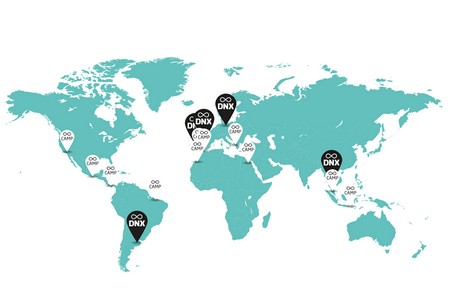 We also started co-working and co-living camps. We started the first job board for location independent jobs. Right now, it is only in German, but we are planning the next step to internationalize it, I think, within the next year—maybe summer 2018.
We also started co-working and co-living camps. We started the first job board for location independent jobs. Right now, it is only in German, but we are planning the next step to internationalize it, I think, within the next year—maybe summer 2018.
We are also now creating a backpack for digital nomads. We have this huge Facebook community where we help people day and night starting their business and also to bring their business to the next level.
So this is how it all started. This is more or less our journey to where we are now. Now, we have a location independent fully remote team on our Slack channel.
We work together with freelancers from all over the world that have us in different aspects of all business, like social media online marketing, design, translation, different event managers for the camps and also for conferences. We have some VAs on board, product managers, and project managers.
So it has been a really crazy journey since coming here and still, I have this feeling it’s just the beginning where we are now in April 2017.
2. How do you see the Digital Nomad movement evolving? What impact will it have ? How do you see it shaping the future?
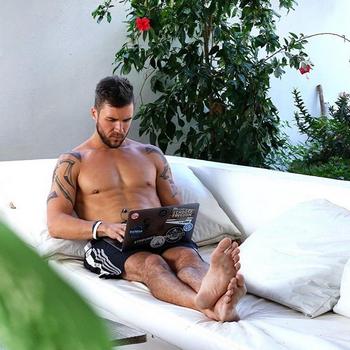 I see we are still in the beginning of it and that it’s not hype or trend anymore. It will evolve into an important part of the future of work.
I see we are still in the beginning of it and that it’s not hype or trend anymore. It will evolve into an important part of the future of work.
It will be getting easier and easier for everyone to dip a toe into this lifestyle and try it for themselves if it something for them. It is not for everyone though—still, we have to be very focused and learn how to be productive on the road.
On the other hand, you get all these huge benefits of meeting other people, learning about other cultures, getting the big picture from the world, making friends from all over the world and just having a great conscious mindset.
The impact of the digital nomads will depend on how deep and how strong you connect to the local cultures and people. I see many good initiatives and projects from all over the world, especially in Southeast Asia: Steve from Hubud, Mike from Dojo Bali, and James from KoHub for Koh Lanta. They are doing a lot to connect to the local kids: they go to school, they go to into co-working spaces, they give workshops there about what we are doing in DNX camp.
We also invite local people to inspire and motivate them. For example, start their own youtube channel just to show them what’s possible in today’s life.
The impact from the digital nomads will be huge. They have the skill sets of an entrepreneur; they know how to build companies; they know how to sell; they know how to solve problems. On the other hand, they see the big picture of the world: they see the real issue; they see the real world problems.
This combined is just crazy powerful. Then this crazy powerful people connect with each other and start things together to make the world better, to make sustainable, cool stuff, and create content.
Then the impact of the digital nomads will be huge. It’s already huge—we see it all over the world. The people who connect with local people who do sustainable things for the animals and the environment.
The people who are most conscious when I’m traveling are all location independent freelancers or entrepreneurs. This is also a good thing that our whole community is conscious. For instance, Feli and I are 100% vegan, living a healthy lifestyle, do a lot of sports, care about the environment and personal development. We know the whole world is set up from duality and whatever we do to someone else it will come back to you.
This is how I see the future for digital nomads. The good thing for the digital nomads is that they are so conscious, they are lifestyle designers, they live their life how they want to live it on their own terms.
For instance, I love kite-surfing and this why I spend 4 months of the year in Brazil, the best kite-surfing spot in the world. I just shape my work life around my lifestyle. First, comes you as a person, then your life, and then comes the job—this is what is meant by lifestyle design.
Besides Brazil, I’m going to Lemnos every year, which is a very remote Greek island with Caribbean blue water, where I can go kiting for some weeks. I always go where it’s warm, removed, and where there is an ocean.
For example, now I’m in northern Koh Phangan in Thailand. In the south, there is a party scene, which Koh Phangan is famous for. But also there is Srithanu, which is in the north-western part of the island, and it is all very spiritual—lot of yoga retreats, yoga and meditation sessions, meetups, lots of organic, green, healthy, weird food.
I love it.
We’re here in an apartment; the internet is quick and we have a nice terrace. I’m so productive—I’m working like hell. This is the best life I can imagine and I don’t want to be in any other place now than here. This is what I’ve been saying since I started my lifestyle as a digital nomad 5 years ago.
I think when you got into this level in your life, you made the right decisions because your time here on planet Earth is limited and you should live it on your own terms, as fulfilled and happy as possible.
No one can conquer you. No one can tell you on how to your live your life or force you into an office.
3. Marcus, you run multiple online businesses, own a successful daily business podcast featuring topics related to entrepreneurship and a healthy lifestyle and you are also a startup investor. How do you manage to do it all? What is your secret? What advice can you give to someone who wants to juggle multiple projects at once?
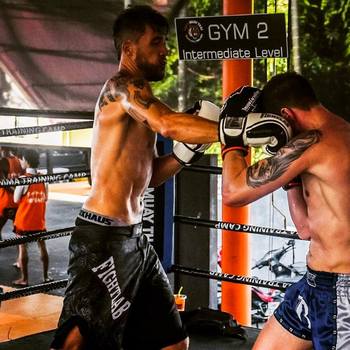 I think my secret is my passion and drive combined with my pain that I had when I was an employee. I had this deep feeling that I have way more potential than just working for an employer, for a company and being limited.
I think my secret is my passion and drive combined with my pain that I had when I was an employee. I had this deep feeling that I have way more potential than just working for an employer, for a company and being limited.
Once I broke free, it never stopped. I don’t know where my energy comes from. When I was a small kid, I was doing sports at a high level every day and I still do them now at 39. It’s been more than 30-35 years. I think this where my energy comes from so I live very healthy. I just eat plant-based foods, whole grains, nothing processed. This how I’m able to do all of this.
Then things just come together. Now I’m hosting a very successful top 10 iTunes podcast where I publish daily episodes. Besides that, we started this big DNX movement with events all over the world with co-working camps. I think we’re doing maybe 4 or 5 camps this year as well as 3 big conferences. Then having the podcast, running the travel blog together with my girlfriend and then having other side projects, like investing in startups, doing consulting, or helping others out.
This is my life, this is my passion. Sometimes I have difficulty sleeping because I can’t stop working and I have to force myself to take some breaks.
I’m using, for instance, the Pomodoro Technique, where you are forced to take a break after 25 mins, then another break and another break. This is one of my secrets and I’m very productive like this because I love to use tools to organize myself.
I have a very strict morning routine [elaborated more in the next question].
There are many hacks in my life as well. I don’t go on my social media accounts before I start with my most important task (M.I.T.), which I mark the evening before. The question is what has the biggest impact on your business and not what is the most urgent task because not everything which seems to be urgent is important. It is very important that you identify this.
I wake up every day with the sunrise here at 6 a.m. By 9 or 10 I already won the whole day—that’s so cool!
This drive brings me through the rest of the day. I think my morning routine is a big secret for me and I’m very good in discipline. I don’t really need to discipline myself because my mindset is so clear on what I want to achieve. There is no other question like if I’m going on Facebook to waste my time or work on projects.
4. You have a strict morning routine to stay focused and productive, would you mind sharing it with us? What else do you do to maximize your potential and productivity?
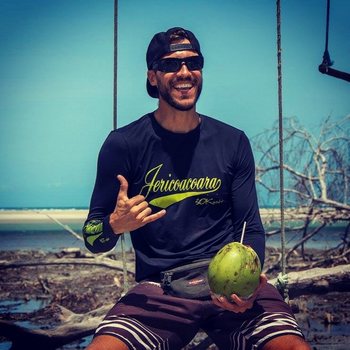 My morning routine is as follows 7 days a week: I wake up with a sunrise every morning which depends on where I am. I don’t need an alarm for it anymore. Here in Thailand, that means 6 at the moment.
My morning routine is as follows 7 days a week: I wake up with a sunrise every morning which depends on where I am. I don’t need an alarm for it anymore. Here in Thailand, that means 6 at the moment.
Then, I make my bed; that’s the first quick win of the day and it gives you a good start of the day to start with a win.
Then I do oil pulling, which brings out all the toxins that collect overnight in your mouth. Oil pulling is an old Ayurvedic technique which I really love. The mouth and tongue are connected to your stomach, and so whatever has to come out goes into your mouth. In the morning, if you do oil pulling for 15 to 20 minutes with coconut oil, you get rid of all the toxins.
After this, I go out in the terrace and see if there are any animals visiting us. I don’t know why, but animals are always around us like birds, dogs, and cats—we love them too. Sometimes I cuddle or play with the cats and fill out my 5-minute journal.
My journal is a gratitude journal with some questions that I have to fill out every day. It asks you what are you grateful for and you have to name 3 things.
Then I’ll be thinking about 3 points on how I will make the day great.
The last point is about daily affirmations. This is reality distortion when you then bend reality in your favor. But believing is not strong enough—behaving like you already achieved this will push your unconscious in the right steps towards this goal.
I also fill the 5-minute journal every evening when I’m in bed and I ask myself for 3 amazing things that happened today, just to reflect on the good things and manifest them.
The last question in the 5-minute journal is how could I have made today even better to strive to become a better person every day and be conscious of what I could have done.
Then its goes to the cold shower, an ice cold shower—I’ve been showering ice cold for the last 3 years.
Then I do a stretching program with a 7-minute app.
After that, when there are no clouds, I look directly into the sun to get the energy from the sun. It’s called sun gazing and this gives me a lot of strength. I don’t wear sunglasses anymore because human beings are fueled and empowered by the sun, by the light, and the energy that comes from the light—we are similar to plants. You should only do this either during the last hour of the day or the first half-hour of the day, not when it is high because it is dangerous.
After this, I meditate with the Calm app. I also recommend the Headspace app.
Then, I eat a healthy breakfast, which is prepared before, with coconut water, chia seeds, and some grains.
Then, I start with the most important task (M.I.T.) or eat the frog concept as some may know. Most of the time it is a task that you tend to avoid because it’s so big. A good hack would be to divide it into smaller parts and just enjoy the process. Just go into the hustle and enjoy every minute of the process. Try not to think about what will you do when you have this task done. It is really about enjoying the process. This is how you get into the zone, and once you get into the zone you don’t think about the task and how hard it is.
Later in the day, I always try to do some sports. Every day, either I read or listen to a Blinkist, a great startup that summarizes the best books in the world. Or I watch a Ted Talk, listen to a podcast, or read an interesting biography on biography.com.
And then I have a rule that I don’t eat anything after the sun goes down—my last meal will be 6-6:30 here. No screens after 9 but most the times it’s by 8 since I get tired. I set priorities for the next day (M.I.T.) that I write in my gratitude journal.
In the evening, I’m trying to learn some Portuguese as I’m in Brazil a lot and training my brain with the Lumosity app.
These are routines that I do every day.
[To maximize productivity] I just recommend the Pomodoro technique. I love this one.
We use Slack with our team in the startup to communicate everything, which really is convenient. We are spread out all over the planet across in different time zones so this helps keep ourselves on track and to separate different projects.
Another productivity tool is Trello, it is a project management tool on which all of our employees and team members can organize ourselves on. I organize myself using Wunderlist though. I also organize my business and private stuff together with Feli with shared lists on Wunderlist and this really works like a charm.
Then, another tool I use when working is Brain.fm, an app that uses binaural sounds, which brings you really into the zone.
5. Do you ever get tired of routines? Do you also plan your times to be creative, impulsive?
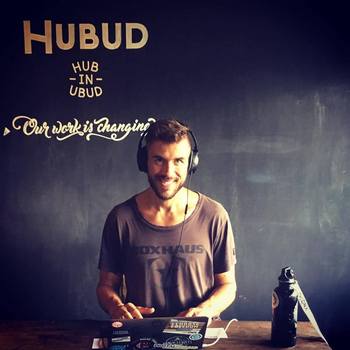 Yeah, sometimes I do get tired of routines and I try not to be too hard on myself. Generally, I’m really disciplined and not too hard on myself if I let go of 2 or 3 routines, like if it’s Sunday. I would say, 80-90% of the time I stick fully to my routines because I’m so on fire and in the zone.
Yeah, sometimes I do get tired of routines and I try not to be too hard on myself. Generally, I’m really disciplined and not too hard on myself if I let go of 2 or 3 routines, like if it’s Sunday. I would say, 80-90% of the time I stick fully to my routines because I’m so on fire and in the zone.
At the moment, we have a pace that I could work day and night which also means I stick to my routines.
I never plan my time to be creative. Whenever it comes, when I feel I’m creative, have good ideas, I try to write them down—I put in in my Evernote. I start to create mind maps. I ask Feli if she has time for business development.
At the moment, we are very operational. Sometimes when we plan to be creative, it’s more about business development. For instance, after the DNX camp on Lemnos, which will end in June, we will have the whole July to plan our future steps.
Generally, we are always in a flow with no peaks and not planning, not being creative because everything we create online, especially the podcast where I go live every day is a creative thing, so I don’t have any problems with switching from executionist stuff to operative stuff to creative stuff.
6. What are some of your favorite spots on the Earth? How often do you move between your favorite places?
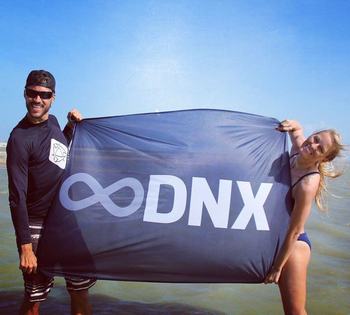 One my favorite places in the world is the Philippines for sure because they have remote, white sand beaches, an awesome ocean, and awesome diving scenery. I’m a rescue diver so I enjoy going really deep. I enjoy wreck diving in the Philippines. I did wreck diving in Coron, where you see Japanese ships, which were bombed by the Americans, on the ground of the ocean from the second World War—it was very impressive. We dived with turtles, with great white sharks; Philippines is the best dive spot I’ve ever been.
One my favorite places in the world is the Philippines for sure because they have remote, white sand beaches, an awesome ocean, and awesome diving scenery. I’m a rescue diver so I enjoy going really deep. I enjoy wreck diving in the Philippines. I did wreck diving in Coron, where you see Japanese ships, which were bombed by the Americans, on the ground of the ocean from the second World War—it was very impressive. We dived with turtles, with great white sharks; Philippines is the best dive spot I’ve ever been.
Another favorite spot for sure is Brazil, especially the north of Brazil called Ceara. Their life is very basic, very simple. They have a long coast for downwinders, which means you can go to the ocean with your kite and you don’t have to go upward. You just let the wind blow you down a few kilometers where you step out of the ocean again. It’s especially popular in the winter time, between September and December, where people are out every day. It’s a lot of fun—small jumps, big jumps, high jumps.
I love Brazil, I love the Philippines and I love Southeast Asia, especially Thailand. I love Indonesia, I love Bali. In the summer, I really love Portugal and Greece. Those are some my favorite spots in the world. Once in awhile I also love Berlin, but only in summer.
Now in 2017, we are not moving too much anymore compared to the frequency we were moving before. Sometimes you figure out for yourself that you will learn very quickly that you can’t be productive when you move places too often.
This is why we’ve been in Brazil from September to December. We have been in Thailand since the beginning of January (2017) and just took a small break to Laos for a visa run. So we will be in Thailand for a total of 4 months and I then go back to Europe, to Berlin and south of Europe.
This year (2017) in September, again we will be back in Brazil. More or less, now we have 4 bases. At the end of the year, it’s Brazil. At the beginning of the year, it’s Southeast Asia, Thailand or Bali. And in summer it’s Berlin and Lemnos, the Greek island I was talking about earlier.
Once in awhile, we’ll go to a new spot like Portugal as well.
7. Which people, books, podcasts, or groups have influenced you the most?
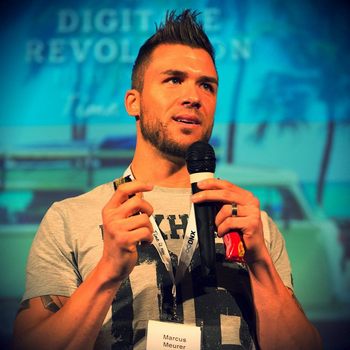 There are many people I love to get inspired by, it’s hard to point out one. I think one who I really like for always challenging the status quo is Tim Ferris. Even his most known book, 4 Hour Work Week, still has gold nuggets when you adapt it to 2017.
There are many people I love to get inspired by, it’s hard to point out one. I think one who I really like for always challenging the status quo is Tim Ferris. Even his most known book, 4 Hour Work Week, still has gold nuggets when you adapt it to 2017.
Then I like Chase Jarvis a lot.
Once in awhile, I love the stuff from Gary Vanderchuck, even when I’m not with him on the side that you have to hustle, hustle, hustle. For me, it’s also about the quality of life and lifestyle design.
I like to listen to the James Altucher Show to the Joe Roegan Experience experience.
I love The Journal by Kevin Rose. I like Noah Kagan’s podcast. I love Seth Godin.
I love Tony Robbins—I’m really excited to go to his event, Unleash The Power Within, in 3 weeks which is in London.
These are some people I really like to listen or read. But, I’m total podcast fan so I listen more than I read.
8. Besides balancing work and travelling, building community, what other challenges do digital nomads have? What advice would you give?
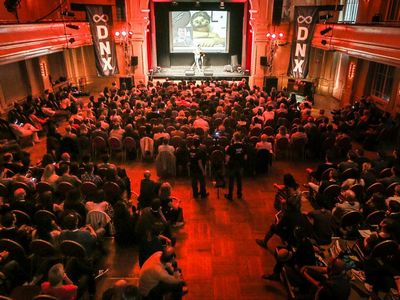 I think the biggest challenge is to connect with other like-minded people, even though it’s getting better and better now that there are many great nomad communities, great nomad dating apps, a lot of meetups, and a lot of community events, especially in the co-working spaces.
I think the biggest challenge is to connect with other like-minded people, even though it’s getting better and better now that there are many great nomad communities, great nomad dating apps, a lot of meetups, and a lot of community events, especially in the co-working spaces.
Then there are co-working camps, like we are doing with the DNX camps to connect like-minded people from all over the world, which, by the way, gives me a lot of input from other entrepreneurs that are joining our camps.
Last year in Lemnos, we had 60 people from all over the world joining for one camp and that’s just mind blowing. Then there are big Digital Nomads conferences which happen once a year and this helps a lot to build a community, to build up strong bonds between each other especially as a nomad.
Other challenges that nomads have could be being productive on the road. I was sharing a lot of tips on this before.
Generally speaking, some people maybe think they could just travel and work from anywhere and the rest will fall and be sorted automatically—this not the case. If you are unhappy at home, you will also be unhappy on the road. If you have relationship problems at home, you will have them on the road as well. It’s not a magic pill that makes your life better.
This why the whole topic of personal development, personal growth with consciousness, is so important, and if not especially important for Digital Nomads to get your stuff together.
My advice would be to connect to with like-minded people especially in our DNX community or the other great communities that are out there.
Also, while it’s important to get in touch with other people, it’s equally important not to end up in a nomad bubble where you just hang out with other nomads. I think this is not the way we make the world better.
“Better,” in my terms, is to connect with the local communities. For instance, when I’m in Brazil, I go to the gym with locals, I go kite surfing with the locals and do capoeira with the locals. Here in Thailand, I do a lot of Muy Thai boxing with the locals.
I always try to connect with local people to try and give something back, to inspire them. I try to always learn from them, have a healthy exchange, and not to see the geo-arbitrage as a one-way street or a one-way lane. It’s giving and taking. This is very important, especially because many people are watching what we are doing and we have a big responsibility.
As Digital Nomads, we should try to make good art, to make sustainable things and good stuff for which we can be proud of.
9. For someone just dreaming to become a digital nomad, what would be the most important thing to start with?
Most important thing would be to read every piece of advice you can get from the internet and then come into our DNX Community to connect with people who are already living this lifestyle.
Secondly, is gaining clarity about what is your passion. When you face hard times, when you struggle, being able to make a living from something that is your passion makes a difference.
If it’s just a business model to follow for money and times get hard, then it gets even harder to stick with it, to go on and follow the path.
If you do it for passion and the money is a side thing, it’s easier for you to sustain yourself—money will come anyway if you do good things.
The most important thing to start with is to surround yourself with like-minded people, to get clear about your passion, and then start planning on how you make money with it. Also not making the mistake of creating the product first without any awareness is important too.
It’s all about giving giving giving, helping other people and building up a reach for your personal brand, for your productized service or whatever you want to offer and then create and shape the product together with your community. It’s way better than starting the other way around.
10. Would you share an example of a “world problem” that the DNX Island
 One of the biggest world issues I see is global warming and the pollution of our oceans, especially since I’m a diver. It’s so sad to see how polluted our oceans are.
One of the biggest world issues I see is global warming and the pollution of our oceans, especially since I’m a diver. It’s so sad to see how polluted our oceans are.
There is a great project from this Dutch guy called The Ocean Cleanup project which would be a great example where we would aim our DNX island.
We would bring together the smartest people in the whole world, especially from the online part but also from other parts, like from science and engineering. We would bring them together to do something like the big politicians are doing in the next weeks in Hamburg for the G20.
The G20 is where the biggest, most powerful countries of the world discuss a lot and cost a lot but in the end, you don’t see much result. This what we want to solve with the DNX Island by bringing together, motivated and talented people from all different backgrounds to solve real world problems.
Thank you, Marcus
---
Photo by Momentesammler Patrick Reymann
Chief Editor
 Tal Gur is an author, founder, and impact-driven entrepreneur at heart. After trading his daily grind for a life of his own daring design, he spent a decade pursuing 100 major life goals around the globe. His journey and most recent book, The Art of Fully Living, has led him to found Elevate Society.
Tal Gur is an author, founder, and impact-driven entrepreneur at heart. After trading his daily grind for a life of his own daring design, he spent a decade pursuing 100 major life goals around the globe. His journey and most recent book, The Art of Fully Living, has led him to found Elevate Society.

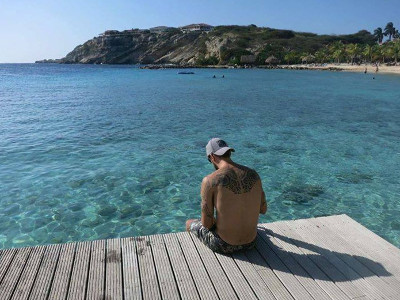 One of the biggest world issues I see is global warming and the pollution of our oceans, especially since I’m a diver. It’s so sad to see how polluted our oceans are.
One of the biggest world issues I see is global warming and the pollution of our oceans, especially since I’m a diver. It’s so sad to see how polluted our oceans are.
















